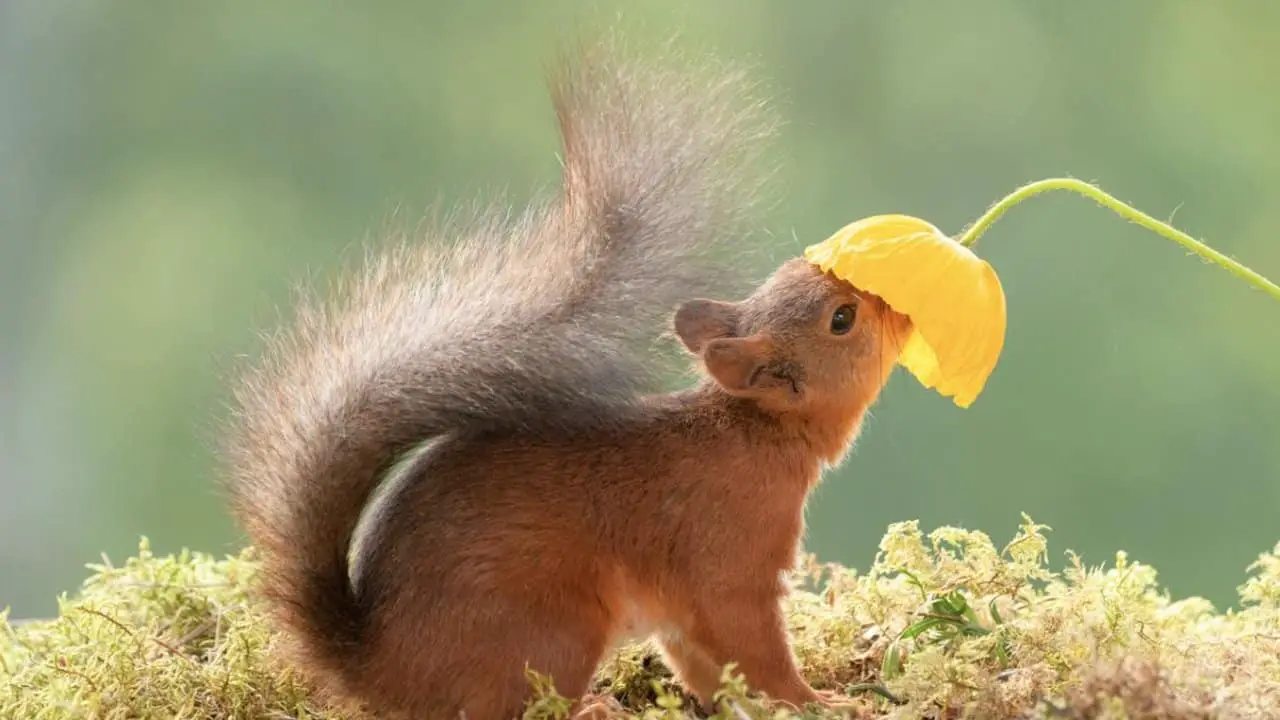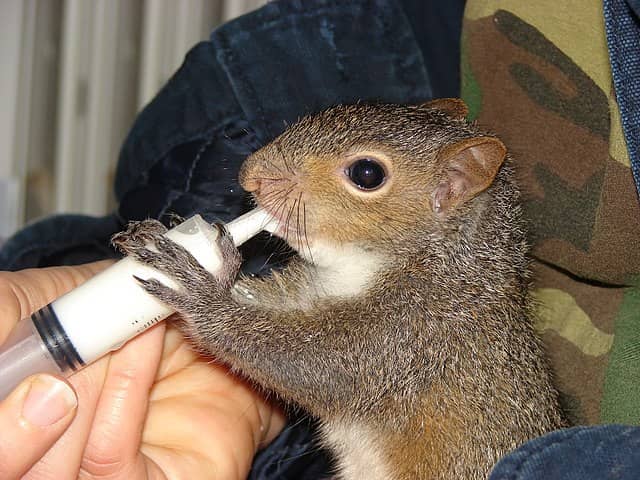Do Squirrels Eat Flowers? Like And Dislike!
Do you have a garden and are worried about whether or not squirrels will eat your flowers?
Do you live in an area where you see squirrels frequently and want to know what plants they tend to go for?
You’re in the right place!
In this blog post, we will be discussing everything related to squirrels and their eating habits.
We’ll cover what flowers they like to snack on, what time of day they prefer to do their eating, as well as how you can keep them from devouring your precious blooms.
Keep reading for more information.
The Short Answer Is…
Squirrels eat flowers such as forsythia, hibiscus, hostas, hydrangeas, knock-out roses, lilies, and marigolds. However, there are many other flowers that squirrels do not eat such as alliums, daffodils, Galanthus, hyacinth, geraniums, fritillaries, etc. and they are natural repellents to squirrels.
What Are The Signs Of Squirrel Activity In Your Yard?
If you think you might have squirrels in your yard, there are several tell-tale signs to look for.
Digging Spots
One of the tell-tale signs of squirrel activity in your yard is the presence of digging spots.
These can be found in flower beds, under bushes, and in other areas where plants are growing. The holes are typically small and neat, and they may be surrounded by piles of displaced soil.
Digging Flower Pots
In addition to digging in the ground, squirrels also like to dig in flower pots. This is often done in search of bulbs or other plants that they can eat. If you notice digging in your flower pots, it’s a good indication that squirrels are present and active in your yard.
Missing Plants
Another sign that squirrels have been in your yard is the disappearance of plants. This is especially common with bulbs, such as daffodils, alliums, and lilies of the valley. If you notice that these or other plants are missing from your garden, it’s likely that squirrels are to blame.
Bite Marks
Another sign of squirrels is the presence of bite marks on fruits, flowers, and leaves. These marks are usually small and round, and they can quickly damage plant life.
Nibble On Nuts
In addition, squirrels often nibble on nuts, leaving behind small pieces of shell.
If you see any of these signs in your yard, it’s likely that you have a squirrel problem and it’s a good idea to take steps to deter squirrels from your property.
Do Squirrels Eat Flowers?
While some people might think of squirrels as being cute and cuddly, gardeners know that these rodents can be real pests.
One of the ways they can damage a garden is by eating flowers. Forsythia, hibiscus, hostas, hydrangeas, and knock-out roses are all on the menu for these critters.
Squirrels will nibble on the petals and leaves of these plants, causing them to look damaged and unhealthy.
In addition, this feeding can prevent the plant from producing flowers or fruit.
There are a number of flower species that squirrels like to eat.
Forsythia
Forsythia is a popular shrub that is often used as a border plant or as a focal point in the garden. The bright yellow flowers are a welcome sight in early spring, and the plant is relatively easy to care for. However, forsythia is also a favorite food source for squirrels.
The furry creatures are attracted to the sweet nectar of the flowers, and they will often strip the plants of their blossoms.
Hibiscus
Hibiscus is another plant that is commonly eaten by squirrels. The large, trumpet-shaped flowers are highly attractive to animals, who appreciate the sweet nectar within.
Hibiscus plants can be severely damaged by squirrels, who may strip all of the flowers from a plant in just a few days.
Hostas
Hostas are a type of perennial that is commonly used as ground cover or as filler in flower beds. The plants are known for their large leaves, which come in a variety of colors and patterns.
While hostas are generally resistant to deer and rabbits, they can be severely damaged by squirrels.
The animals are attracted to the tender leaves of the plant, and they can quickly decimate a bed of hostas.
Hydrangeas
Hydrangeas are popular shrubs that are known for their large, showy flowers.
The plants come in a variety of colors, including white, pink, and blue, and they require very little care.
However, hydrangeas can be damaged by squirrels, who are attracted to the sweet nectar of the flowers. In addition, the animals may also eat the buds and leaves of the plant.
Knock Out Roses
Knock Out roses are a type of hybrid rose that is known for their resistance to disease and their ability to bloom continuously throughout the growing season.
The plants are available in a variety of colors, including pink, red, and white.
While knock-out roses are generally resistant to pests, they can be damaged by squirrels, who enjoy eating the buds and flowers of the plant.
Lily
Lilies are a type of flowering plant that is available in a wide range of colors, including white, yellow, pink, and red.
The plants are relatively easy to care for, and they make a beautiful addition to any garden.
However, lilies can be damaged by squirrels, who are attracted to the sweet nectar of the flowers.
In addition, squirrels may also eat the buds and leaves of the plant.
Marigold
Marigolds are a type of annual that is commonly used as a border plant or as a filler in flower beds. The plants are available in a variety of colors, including yellow, orange, and red.
Marigolds are known for their strong scent, which helps to repel pests such as rabbits and deer.
However, the plants can be damaged by squirrels, who are attracted to the buds and flowers of the plant.
Monkey Grass
Monkey grass is a type of evergreen that is commonly used as a ground cover or as a border plant. The plants are available in a variety of colors, including green, gold, and variegated.
Monkey grass is relatively easy to care for and is generally resistant to disease. However, it can be damaged by squirrels, who enjoy eating the tender leaves of the plant.
Petunia
Petunias are a type of annual that is often used as a border plant or as a filler in flower beds. The plants are available in a variety of colors, including pink, purple, and white.
Petunias are known for their ability to deter pests, but they can be damaged by squirrels, who enjoy eating the buds and flowers of the plant.
Rhododendrons
Rhododendrons are a type of evergreen that is often used as a border plant or as an accent in the garden. The plants are available in a variety of colors, including pink, purple, and white.
Squirrels can harm rhododendrons, which they enjoy eating from the buds and blooms.
Tulips
Tulips are a type of perennial that is often used as a border plant or as a focal point in the garden. The plants are available in a variety of colors, including pink, red, and white.
Tulips are a favorite food of squirrels, who enjoy eating the buds and flowers of the plant.
Zinnia
Zinnias are a type of annual that is often used as a border plant or as a filler in flower beds. The plants are available in a variety of colors, including pink, red, and white.
Squirrels may nibble on the leaves of zinnias, but they generally prefer to eat the buds and flowers of the plant.
While most plants can recover from being nibbled on by squirrels, damage to the buds or flowers can diminish their growth.
- Related: How Often! Do Squirrels Eat Apples?
Do Squirrels Eat Plants At Night?
The answer to whether squirrels eat plants at night is complex.
Usually, they stick to daytime hours; however, if they’re feeling particularly hungry, it’s not uncommon for them to come out and look for food at nighttime too. If this happens often enough, your plants may be at risk.
If you’re concerned about squirrels eating your plants, it’s preferable to take action sooner rather than later. Squirrels are more likely to eat vegetation in the early hours of the morning before you wake up.
For example, try using a squirrel feeder or spraying your plants with a combination of water and cayenne pepper to deter them.
What Flowers Squirrels Do Not Eat?

If you’re looking for flowers to plant in your garden that squirrels are not likely to eat, you may want to consider daffodils, alliums, Galanthus, hyacinth, lily of the valley, geraniums, or fritillaries. They deter animals like squirrels, rabbits, and deer because of their unpalatable taste and fragrant odor.
Alliums
Alliums, a type of onion, not only make beautiful edible flowers but also contain an enzyme that deters rodents like squirrels from eating them.
Galanthus
Galanthus, also known as snowdrops, are small white winter-blooming flowers. Furthermore, the bulbs of this plant have a chemical compound that keeps animals such as squirrels at bay.
Hyacinths
Hyacinths are beautiful, fragrant flowers that grow from bulbs. The bulbs of the plant contain a chemical that deters some squirrels.
Lily Of The Valley
Lily Of The Valley is a dainty bell-shaped flower with long leaves which makes for a great addition to any garden and is generally not favored by squirrels.
Geraniums
Geraniums are perennials that come in colors like pink, red, and white. They usually don’t attract squirrels because they give off quite a scent.
Fritillaries
Fritillaries are a part of the Lilaceae family that exudes such an unpleasant odor that it acts as a deterrent for squirrels looking for food.
Marigold
Marigold flowers come in a variety of hues, including yellow, orange, and red. They may be utilized as a natural insect repellant for a number of animals, including squirrels.
Goldenrods
Goldenrods are lovely summer blooms that brighten any space. They aren’t the preferred food for squirrels and can actually help keep them away from other plants in your garden.
All of these blossoms make fantastic additions to any garden where you want to shoo squirrels away.
How Do You Keep Squirrels From Eating Your Flowers?
Any gardener knows that pesky squirrels can quickly decimate a flower bed.
Their sharp claws and teeth make short work of most plants, and they have a particular fondness for bulbs and roots.
If you’re tired of finding your flowers in pieces, there are a few steps you can take to deter squirrels from your yard.
First, try planting flowers that squirrels don’t like.
Many species of squirrel are repelled by the scent of marigolds, so clustering these bright blooms around your flower bed can help to keep them away.
You can also try spraying your plants with a mixture of water and cayenne pepper or installing a fence around your garden.
By taking these precautions, you can give your flowers the best chance of survival – even with hungry squirrels on the prowl.
Conclusion
Do squirrels eat flowers? Yes, they certainly can.
If you’re having issues with squirrels eating your blooms, there are a few things you can try. Planting flowers that squirrels dislike, such as marigolds, or dousing your plants with a water-and-cayenne pepper solution may help.
You might also construct an enclosure around your garden to keep them out using these methods. In conclusion, these strategies can guarantee that your flowers stay safe and unharmed from these fluffy creatures.

![Can Birds Really Eat Cheese? Pros & Cons? [Video] Can Birds Really Eat Cheese? Pros & Cons? [Video]](https://intoyard.com/wp-content/uploads/2021/10/Untitled-design-3-1.jpg)
